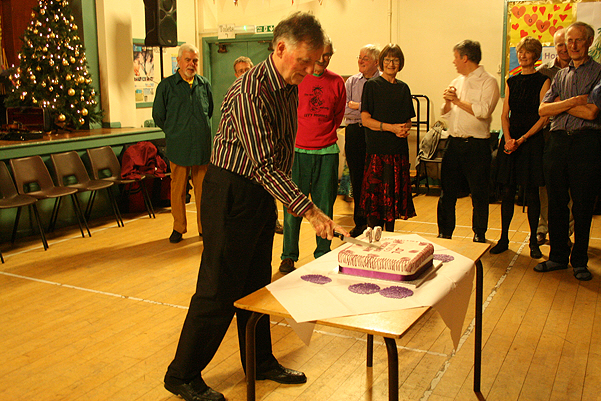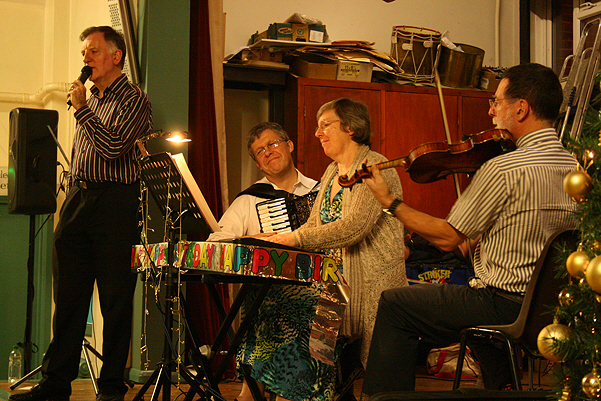 Retrospective
Retrospective
Colin Hume looks back on his involvement with Folk
 The original version of this article was published in English Dance & Song magazine, Winter 2014. I was then 70, a time to reflect on how I got where I am now, and maybe inform my opinions about Folk Dance — how it got where it is and where it's going now. First the autobiographical stuff.
The original version of this article was published in English Dance & Song magazine, Winter 2014. I was then 70, a time to reflect on how I got where I am now, and maybe inform my opinions about Folk Dance — how it got where it is and where it's going now. First the autobiographical stuff.
I was born on 26th November, 1944, not long before the end of the Second World War — so if I'm still alive I'm now JavaScript is disabled, so work it out for yourself! — and grew up in Streatham, South London. My Folk career started in the Scouts in Streatham, where I learnt to play guitar for an item in our group's annual show, probably around 1957. From there I moved on to become a Folk Singer, performing (while at university, 1964-1967) in the smoky upstairs room of the pub in Durham where the Folk Club met. Later I sang and listened in Folk Clubs in South Hampshire, sang at my United Reformed Church in Chandlers Ford (including an appearance on BBC radio) and was also in a Folk duo (for which we sometimes even got paid) and gave guitar lessons to children. It was Dave Williams (a far better-known singer than me) who told me that I should go to Christchurch Folk Festival as I would really enjoy it. I went for the singing — and discovered the dancing! It took over completely, and within a year I was hardly playing my guitar at all, which I would not have believed possible.
It was also at Christchurch Folk Festival a few years later that I was in the marquee talking to the band, and the caller hadn't turned up. They asked me if I called, and I said no, but I could probably remember a couple of dances. I told the crowd “I don't know what I'm doing, but it's me or nobody”, and I ended up calling for half the evening! Looking back, I'm amazed. To my advantage I was used to being a performer, but of course I had no cards — nothing. We got to the ladies' chain in “Devil's Dream” and I said — “Hold on, that won't work — let's try it again with the ones improper” and they all laughed and went back.
Someone who had been at the weekend asked me if I was interested in doing some more calling, as he knew a club in Uxbridge, West London, who were always looking for callers. I went along, and met Peter Jenkins who played for them. He asked the woman in charge to book me for a second evening so that he could confirm his impression of me, and at the end he told me he was just about to form his own band, Kafoozalum, and offered me the job as their regular caller. That was in 1978.
 It was mainly barn dances of course. Peter isn't a caller but he knows a lot about the job, and he impressed upon me: “First and foremost, you are an entertainer”. I've never forgotten that, but I find some well-known callers are baffled when I say it — they see themselves as teachers. I don't accept that the two are incompatible; indeed I think that if you're entertaining you have a much better chance of people taking in what you're teaching, whether it's dancing or computer programming.
It was mainly barn dances of course. Peter isn't a caller but he knows a lot about the job, and he impressed upon me: “First and foremost, you are an entertainer”. I've never forgotten that, but I find some well-known callers are baffled when I say it — they see themselves as teachers. I don't accept that the two are incompatible; indeed I think that if you're entertaining you have a much better chance of people taking in what you're teaching, whether it's dancing or computer programming.
In 1980 I published “Dances with a Difference, Volume 1” and that got me better known. I went to Sidmouth with Kafoozalum in 1981 as their roadie, with a few calling opportunities, and again began to get better known. I also started doing my own interpretations of dances that I'd danced and just didn't believe; I later discovered that Mike Barraclough had started the same way. In the early days some people were hostile to a young whippersnapper daring to challenge the received wisdom. Now I'm old and they're dead, and some dancers even prefer my versions of Newcastle, Dick's Maggot and others.
I've always enjoyed dancing, calling and writing both Playford- and American-style dances, which seems fairly unusual; people want to categorise me and I don't fit their pigeon-holes — particularly when I tell them I also enjoy calling children's dances.
But while I was changing (and perhaps improving) as a dancer, caller and choreographer, the dance world was also changing. At one time folk singing and dancing was a perfectly normal thing to do, but now it doesn't seem so. Brenda Godrich remembers the time when the queue to dance at Cecil Sharp House every Saturday evening would go most of the way round the block; now there are far fewer dances and the numbers are usually small. The dancers and singers have got older, and generally speaking the younger ones aren't coming along to fill up the gap. I believe this is true of many organised activities, such as amateur dramatics, and Robert D. Putnam's book “Bowling Alone” analyses these changes with a mass of supporting statistics. He's talking about the USA, but I think the results are equally applicable to Britain. His conclusion is that the downturn in civic engagement coincided with the breakdown of the traditional family unit. He also suggests pressure of time and money, including the special pressures of time on two-career families, commuting, electronic entertainment especially television, and most important, generational change — the slow replacement of the long civic generation by their less involved children and grandchildren.
Of course there are exceptions. NYFTE, the National Youth Folklore Troupe of England, is a great team under the inspired leadership of Dave Leverton for many years. Contra groups such as Meg Winter's at Alcester are attracting younger dancers. Jen Morgan has started a successful series of Zesty Playford in Coventry, and there have even been Zesty Playford sessions at several dancers' festivals! But in the main the dance clubs are ageing, and a young person walking in would probably walk straight out again.
Gareth Kiddier asked Jen Morgan and me to set up a Sidmouth Social Dancers' Survey in order to gauge what would need to be changed when he took over as Dance Director. By far the largest number of respondents were in the age range 50-69. Most of them had been involved with Folk for 30 or more years. Most rated themselves as Experienced, whether as Dancer, Caller or Musician; only for Organiser was it the other way round.
Now it could be that the survey didn't reach the younger inexperienced dancers, or that they didn't feel like taking part, but it reinforces my belief that most of us are quite old and the new blood just isn't there.
What we need is a group of charismatic, enthusiastic young people who will take things over, throw out what isn't relevant (including the Dance Clubs, EFDSS and even ED&S if necessary) and attract new people to Folk. One charismatic teacher at a school can inspire a whole generation of children with a love of Folk Dance. I realise that EFDSS is doing a lot more in the way of educating children than it used to, which I highly approve of. But what can we do as individual dancers, callers or club committee members? I think we need to make our dance evenings more fun, and more lively. I love to call and dance some of the complicated Pat Shaw dances, for instance, but they're not going to appeal to a bunch of newcomers.
The other question to ponder is this: Is the dancing at your club inspiring? I don't mean people being flashy to show how clever they are; I mean people dancing well, showing that they are enjoying it, bringing the dance to life. I'm afraid a lot of clubs are a few old people plodding through complicated figures. Presumably they're enjoying it, or why would they do it — or has it just become a habit? Do you give newcomers something to aspire to — some role models that they can watch and think “Wow, I'd like to dance like that”?
EFDSS and the Royal Scottish Country Dance Society (RSCDS) started out in much the same way — a small group of charismatic enthusiasts who inspired others with their vision. But EDFSS changed dramatically after the Second World War when Douglas Kennedy replaced classes and teachers by clubs and callers — a significant shift of emphasis. I'm not saying that I like the RSCDS approach — it's too regimented and authoritarian for me — but I can't deny that it produces better dancers. Very few callers on the English dance scene do any teaching of how to dance; they just call dances.
I know some people think I'm rude, arrogant, critical and so on, but the reason I'm that way is that I want people to dance better and I won't put up with the half-hearted attempts some people make. I have a lot of time for newcomers — I helped run the Beginners sessions at Cecil Sharp House for many years — but I get impatient with people who have been dancing for years and still won't make any attempt to improve. I really object to the attitude of “I came here to enjoy myself, not to be told how to do it” — my experience is that I enjoy things much more if I'm doing them well, and I know there are others who feel the same way.
If you'd like to read more of my views, this website contains essays and technique notes together with instructions for about 500 dances (with music if any), my Callers' notes, and even my Dance Organiser program which could revolutionise the way you plan and call dance sessions.
Of course I did more to celebrate my 70th birthday than just write this essay!
Val McFarlane organised a large birthday cake for my House Party weekend — part chocolate cake and part carrot cake — and the woman who made it did some research and decorated it with Feuillet notation! Thanks also to Val for sending me the photo.

At my 70th Birthday Dance three weeks later, Renata surprised me with another beautiful cake!

And here I am calling the dance with Contradition.

